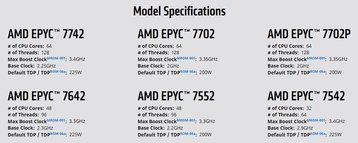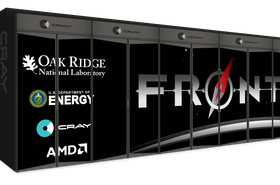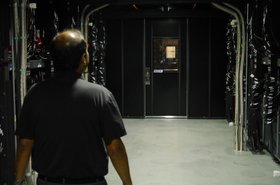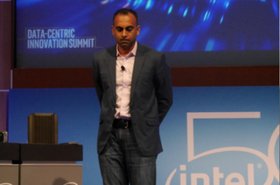AMD has officially launched the second generation of its Epyc server CPU line, previously codenamed Rome.
The company also announced two major customers for its new 7002 Series processor family: Google and Twitter.
Not Intel's day
AMD claims that the 7nm processors deliver up to 23 percent more instructions per clock per core on server workloads and up to four times more L3 Cache compared to the previous generation.
The family of processors sport 128 PCIe lanes, 8DDR4, up to 3200MHz max DDR frequency and up to PCIe 4.0 support.
"The AMD Epyc 7002 Series value proposition is simple: more cores open the door for more virtual machines, better consolidation, lower cost, and simpler management. 7nm technology enables powerful and efficient processors that are capable of delivering more performance at the same power," Raghu Nambiar, AMD's corporate VP and CTO, said.
The company claims that its most powerful 64-core Epyc, which has a list price of below $7,000, outperforms Intel's Xeon 8280M, which costs $13,012. Intel has contended that such comparisons do not take into account its custom hardware business, with roughly half of the CPUs it shipped to cloud vendors in 2017 being customized for specific requirements.
Raejeanne Skillern, GM of Intel's Cloud Service Provider Group, told us last year: “It takes years to prove that you can design, deliver, support this kind of infrastructure at scale.
“We did our first optimization work with Google in 2008. We’ve worked with Amazon for over a decade… we have taken this and built the capability to develop semi-custom products specifically for our customer base. It makes us unique - we develop custom ASICs, custom silicon when our customers demand.”
At the Epyc launch event, Google said that it was already using the AMD's latest in its data centers for internal workloads, and that later this year it would bring Epyc to Google Cloud.
The virtual machines powered by the processors "will be the largest general-purpose VMs we’ve ever offered," the company said.
Google's Bart Sano, VP platforms, and Brad Calder, VP engineering, said in a blog post: "Available with 2.25Ghz base frequency, 2.7Ghz all-core-turbo frequency, and 3.3Ghz single-core turbo frequency, Epyc processors start at 2 vCPUs and scale up to over 200 vCPUs. They will support RAM-to-vCPU ratios from 1 to 8."
Existing Epyc user Tencent said that it plans to introduce an SA2 cloud instance based on the 7002 Series later this year.
Social media and advertising company Twitter will also start using some Epyc chips, which AMD claimed would improve the total cost of ownership of Twitter's data center costs by 25 percent.
Both Google and Twitter will remain large purchasers of Intel CPUs.
AMD also announced more than 60 ecosystem partners supporting Epyc, including most server manufacturers. Lenovo, Dell, Gigabyte, Penguin Computing, HPE and Supermicro were among those announcing products with Epyc processors.
For further analysis, be sure to check out our coverage from the event itself




